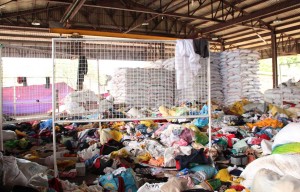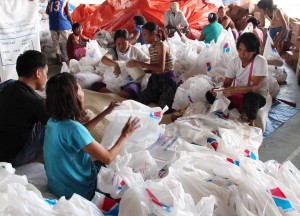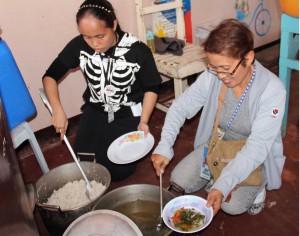
The Department of Social Welfare and Development (DSWD) Secretary Corazon Juliano-Soliman said today that assistance to families affected by the flashfloods and the armed conflict in Zamboanga between government forces and the Moro National Liberation Front-Nur Misuari Faction are sufficient.
According to Soliman, “Even if there are additional estimated 9,000 individuals affected by recent flooding in Zamboanga, we still have adequate relief assistance to be distributed to all of them.”
As of October 10, a total of P969,500 worth of food packs were provided to 3,878 families who were affected by flooding in 13 barangays in Zamboanga City. In Siocon, Zamboanga del Norte, the DSWD was able to allocate P600,000 worth of food packs to 2,400 families affected by flooding. These families are now temporarily housed in different evacuation centers in their respective barangay halls and elementary schools.
For the families affected by the armed conflict, relief assistance as of October 10, already reached a total amount of P138.9 million. Of the amount, the DSWD extended P133,449,401.00 while the local government of Zamboanga provided P1,148,100 and non-government organizations and other groups poured in P4,343,462.

Social Welfare and Development Secretary Dinky Soliman said that the DSWD aid include: P129.75 million for food assistance such as meals, family food packs, bottled water, rice, and canned goods; P2.8 milion for non-food items like blankets, mats, mosquito nets, hygiene kits, and tarpauling; P434,000 for financial assistance for the rescued and bereaved families: and P464,300 for cash-for-work operations of community kitchen, hygiene and sanitation and meal distribution in evacuation centers.
Relief augmentation
Likewise, food and non-food augmentation amounting to P31.8 million were provided by DSWD Field Offices X, XI, XII, and CARAGA as well as from the DSWD-National Resource Operations Center.
Some P181.5 million has also been earmarked for the essential relief needs of the conflict-affected families.
In Barangay Taluksangay, situated 19 kilometers east of Zamboanga City’s commercial district, some 9,115 evacuees coming from 13 barangays are temporarily housed at the Taluksangay Elementary School. “All the evacuees here in Taluksangay are provided by the DSWD with food packs after every three days cycle,” Day Care worker and Barangay Coordinator for the evacuees Hadzar Alaja said.
Convergence with NGOs
According to Alaja, there are sufficient relief food and non-food items provided by the DSWD and other non-government organizations such as the International Committee of the Red Cross (ICRC), International Organization for Migration, Habitat for Humanity, Rotary Club International, JCI International, Save the Children, World Vision, Western Mindanao State University, Ateneo de Zamboanga University, Child Abuse Prevention and Intervention Network, Community and Family Services International, Universidad de Zamboanga, and the USAID, among others.
He said that for ICRC now provides cash for work for the affected evacuees through cleaning of the evacuation centers to ensure that they are safe from illnesses and other forms communication diseases. “It is the primary concern of the ICRC to converge with DSWD in helping the evacuees to be clean, safe, and healthy,” Alaja pointed out.
The ICRC with its local counterpart, the Philippine National Red Cross, has committed to partner with the government to provide relief food assistance to the evacuees particularly in Barangay Taluksangay, a Muslim community established by the Nunos where most of the Muslim families from the 13 conflict-affected barangays fled to seek safer grounds.
Hussein Abubakar, Field Officer for ICRC revealed that aside from relief assistance from DSWD, ICRC also regularly provides relief food packs to the 2,099 families. The packs that they provide include rice, canned goods, coffee, and other non-food items such as detergent and bath soap.
Abubakar also stressed that cash-for-work (CFW) has also been implemented tapping 30 persons from the said evacuation center. These persons are tasked to conduct cleanliness drive in the interest of ensuring sanitation of the center. Per batch is allotted with a 5-day work at a rate of 150/per day. DSWD, who identifies the CFW beneficiaries, selects the beneficiaries based on certain criteria. Priorities are those family heads with big number of children, solo parents, and others needing special assistance.
Families moving to a resettlement area
Twenty-two (22) temporary shelters (bunkhouses) will be built in a 1.4 hectares of land offered by the family of Barangay Captain Abdurahman Nuno who founded barangay Taluksangay in the 17th century. These temporary shelters can accommodate 220 family evacuees.
“This is part of the rehabilitation plan of Zamboanga where DSWD, the local government of Zamboanga, and Habitat for Humanity agreed to form a partnership particularly in building temporary and permanent shelters for the victims whose houses were razed in the conflict-affected areas,” Secretary Soliman said.
Secretary Soliman also said that better homes would be built so that the conflict-affected families will no longer be called “evacuees” since their new houses will be resilient to storms and other natural calamities.
Radzma Sangkahan, 23, from barangay Talon Talon, who occupied one of the rooms at the evacuation center in Taluksangay expressed appreciation to the DSWD for giving them regular relief packs of rice, noodles, canned goods, and hygiene kits. “We manage to cook our own food in the community kitchen unlike in the previous days that we were

just waiting for the cooked food to be rationed to us every meal,” Sangkahan added.
“The bayanihan spirit is alive also in the evacuation center which to me is already embedded in our culture,” she stressed.
With the temporary shelter, Sangkahan realized that she and her family would still love to go back to their house in Talon Talon. “The provision of temporary shelter would help and give us the chance to normalize our lives, but we still want to go back to the place we left because our source of income is there,” she retorted ###


